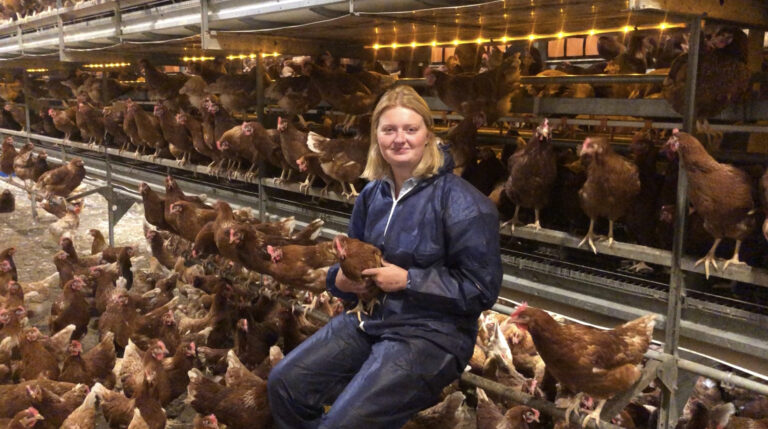Extending laying cycles has been a focus for the UK free-range layer industry over the past few years, with some producers now keeping hens well beyond the UK’s 72-week average, achieving new targets of 90-100 weeks. However, this doesn’t come without its challenges, with eggs from older birds often having weaker eggshell strength and quality.
As the birds age, calcium and phosphorus requirements increase to foster both good bone strength and eggshell quality. Hannah Elliott, monogastric sales and technical support at Lallemand Animal Nutrition, and Harriet Smith, poultry specialist at Crediton Milling Co, explain how paying close attention to calcium levels can help to optimise eggshell quality and bone strength of longer laying birds.
“Calcium needs to be supplemented in accordance with feed consumption. So essentially, if feed intakes are high, the birds are getting more calcium through the core diet, so they won’t need as much added to their feed,” explains Smith.
“One important thing to remember however, is that calcium requirements will increase with age. Sometimes when birds are performing well, there’s a tendency to stay on a layer one diet for example, to not impact production. But doing this will mean that calcium and phosphorus levels in the feed won’t match requirements. As birds age they need extra calcium resources while phosphorus should be reduced as it can have a negative impact on calcium metabolism if over supplied.”
How to add calcium to the diet
Once you have assessed feed consumption and identified the correct level of calcium required, the next step is to decide how this is supplied, for example whether a fine or coarse particle size is used, and whether this is added to the ration or available as a separate source.
“Limestone can be used to improve calcium levels, but it’s important the right grade of limestone is chosen for your system. As the birds age, they will need coarser limestone, and products like oyster shell can be used. When supplying calcium, aim for a 40:60 split with more calcium being available in the afternoon to support overnight shell formation.
“It’s advisable to supplement this separately, rather than adding it to the ration, as it means it won’t affect the nutritional value of the feed. If it’s added to the feed and a bird doesn’t require it at that particular time, it could create feed wastage. It’s therefore better to offer it separately in an easily accessible place. Often, birds will know when they need it and will go and find it,” Smith adds.
During early chick life, high levels of calcium are not needed as the birds have not reached laying age. But once they have reached around 5% of lay, or around 21 weeks of age, the additional calcium should be supplied.
Many producers have also found that adding a specific probiotic bacteria to poultry feed can benefit calcium retention, as Hannah Elliott explains.
“During recent trials, we found that adding the probiotic bacteria Pediococcus acidilactici CNCM I- 4622 – known commercially as Bactocell – to the diet created a significant increase in calcium retention, as well as the improved gut health benefits that we usually see,” she says.
“This is because Bactocell uses the non-digestible sugars in the diet and turns them into lactic acid, which creates an acidic environment in the digestive tract and gut. This in turn facilitates the ionisation of minerals which improve absorption rates, and is why we see better calcium retention.”
As birds age, egg quality tends to reduce which can result in a greater number of eggs being downgraded by packers due to egg fragility.
“Our data has shown that by adding the specific probiotic bacteria to the diet of free-range birds after 26 weeks, overall egg weight increased by 4%, eggshell thickness increased by 5% and there was an 8% increase in calcium retention,” adds Elliott.
Improving bone mass through calcium retention
Increasing calcium retention levels will help keep egg quality consistent throughout extended laying cycles, making hens more productive and profitable. However, as the birds age, we must ensure that producing eggs is not at detriment to bone health and bone mass.
Birds experience metabolic competition for calcium and phosphorus, as it is needed for both bone regeneration and to make eggshells. If the immune system is challenged, for example by disease pressure, birds may experience oxidative stress which will heighten the risk of weak bones.
“Reactive oxygen species (ROS) are naturally produced from the bird’s mitochondria as a normal product of cellular metabolism. Oxidative stress is caused when there are too many ROS compounds present, which increases the number of cells that degrade the bone to release minerals. Simultaneously, the ROS reduce the number of cells that are responsible for re-mineralising the bone,” explains Elliott.
Although releasing calcium and phosphorus through bone breakdown is beneficial for producing quality eggs, these macro-minerals need to be replaced as part of rebuilding the bone so as not to cause fractures and breakages.
“As a result, it’s critical that birds have sufficient antioxidant levels in the diet to neutralise excessive ROS. This can be provided through Vitamins A, C & E but also specific trace minerals such as selenium, which will help ensure that macro-minerals are continuously replaced and bones can be re-built.
“So when looking at overall egg production and bird health, ensuring adequate calcium availability plays a significant part in supporting eggshell quality and strength, but other minerals should also be considered due to their important role in preserving bone strength and health.”

Chloe Ryan
Editor of Poultry Business, Chloe has spent the past decade writing about the food industry from farming, through manufacturing, retail and foodservice. When not working, dog walking and reading biographies are her favourite hobbies.

